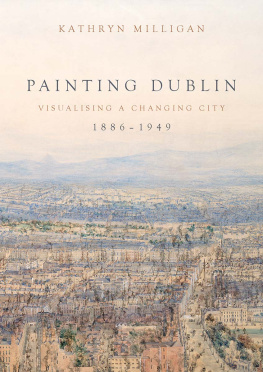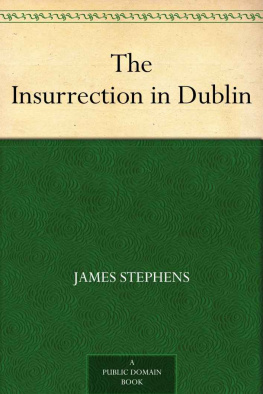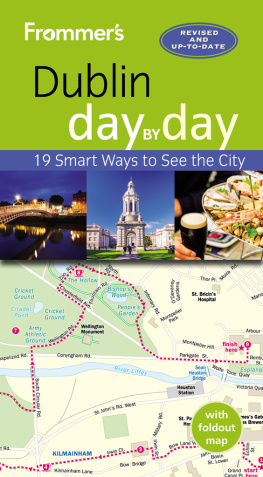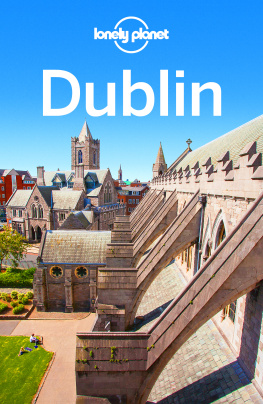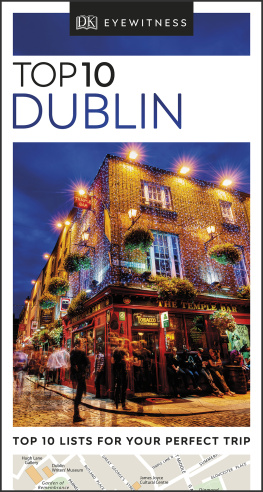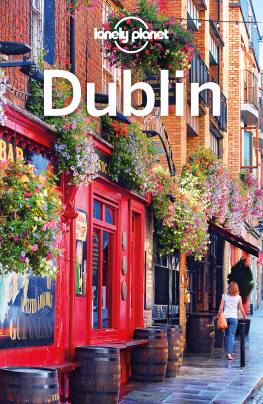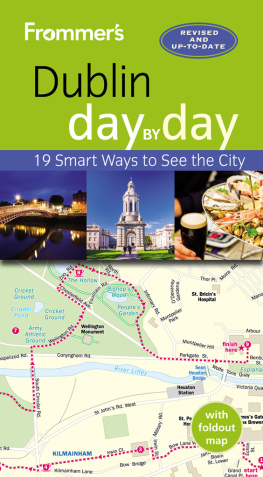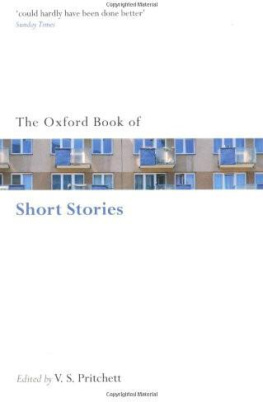V.S. Pritchett - Dublin: A Portrait
Here you can read online V.S. Pritchett - Dublin: A Portrait full text of the book (entire story) in english for free. Download pdf and epub, get meaning, cover and reviews about this ebook. year: 2011, publisher: Bloomsbury Publishing, genre: Detective and thriller. Description of the work, (preface) as well as reviews are available. Best literature library LitArk.com created for fans of good reading and offers a wide selection of genres:
Romance novel
Science fiction
Adventure
Detective
Science
History
Home and family
Prose
Art
Politics
Computer
Non-fiction
Religion
Business
Children
Humor
Choose a favorite category and find really read worthwhile books. Enjoy immersion in the world of imagination, feel the emotions of the characters or learn something new for yourself, make an fascinating discovery.

- Book:Dublin: A Portrait
- Author:
- Publisher:Bloomsbury Publishing
- Genre:
- Year:2011
- Rating:4 / 5
- Favourites:Add to favourites
- Your mark:
- 80
- 1
- 2
- 3
- 4
- 5
Dublin: A Portrait: summary, description and annotation
We offer to read an annotation, description, summary or preface (depends on what the author of the book "Dublin: A Portrait" wrote himself). If you haven't found the necessary information about the book — write in the comments, we will try to find it.
Dublin: A Portrait — read online for free the complete book (whole text) full work
Below is the text of the book, divided by pages. System saving the place of the last page read, allows you to conveniently read the book "Dublin: A Portrait" online for free, without having to search again every time where you left off. Put a bookmark, and you can go to the page where you finished reading at any time.
Font size:
Interval:
Bookmark:
A Portrait
V. S. PRITCHETT

When I look back on my early life as a writer, I see what a great debt I owe to the Irish short story writers of this century. The debt goes back to 1922. The Anglo-Irish Treaty had been signed, the Civil War had started. As a twenty-one-year-old journalist I was sent to report on the response of ordinary people to their situation as one of the first newborn states in Europe. I soon found myself in a marvellously eloquent city, listening to Yeats and AE, and I revelled in the Abbey Theatre. Never can an aspiring writer have been more indulgently welcomed. I stayed for two years and in this time the gifted younger writers were teaching me their art. I often returned and in 1967 I stayed for many months and wrote Dublin: A Portrait.
Dublin as it is; Dublin as it was. I must declare my interest. It is very personal. If I were to write an account of my education the city of Dublin would have to appear as one of my schoolmasters, a shabby, taunting, careless, half-laughing reactionary. His subject? History, of course. I did in fact have such an Irish master at my London school. His name was Callaghan; he glittered with mocking amusement during school prayers and was famous for his tempers, his personal disasters and his scorn. After reading something I had written, he delighted himself and our class by demonstrating to all of us, and with exact command of language, that I was raving mad. When I first came to Dublin, he was often in my mind.
This was in January 1923 when I crossed the Irish Channel as a very young journalist to write about the Civil War. I spent two separate years there, with a long interval between in Spain. I had been living in Paris and arrived in Dublin innocently wearing a broad-brimmed green velour hat and a trench coat: if you add a revolver, I was the very pictureonly less dismalof that gunman whose statue adds nothing to the aesthetic attractions of Athlone. My equipment was quickly stolen from me by protective friends. At Westland Row I stepped out into the sleet, and into the smell of horse manure that was the general smell of Dublin in those days and drove by outside car to an hotel in Harcourt Street. It was, to my astonishment, a temperance hotel. The jarvey, who was drunkish, whipped up his fast little pony and delivered a long speech full of Bedads, Begobs, and Please Gods and with asides about the terrible state of the unfortunate country as we drove; he turned out to be a Cockney. Dubliners and Cockneys have a cheerful taste for disguise, and a common adenoidal quality in their vowels.
The worst of the Civil War was over in Dublin but one was frequently stopped by military patrols in the street and searched for arms; there were raids by lorry loads of troops in the night. There were occasional rifle shots. One explosion brought the soot down the chimney of my roomand comments from the chambermaid. But the war had moved to the south-west and after a while I followed it there, spending my evenings with commercial travellers who paid no attention to the Troubles, in going to hear an English Shakespeare company who were playing to packed houses in Cork and other places. The line in Hamlet saying that everyone in England was madthereby confirming my schoolmasterwas wildly cheered.
My first Irish friends were boundlessly hospitable, of course, but they pointed out to me that I belonged to a fleshly, materialist, sensual nation given to sex, the love of money and over-eating. This could have been true for I have met the same remark in Aarland Usshers The Face and Mind of Ireland; but I must point out that Dublin was then, and still is, a city where very fat, black-haired, red-faced men abound, men as soft and plump as tenors in training. This is said to be due to a diet of Guinness and Dublins excellent bread. For myself, in two years of Ireland, I faded away to wanness in that languid climate and was rarely able to get up before eleven in the morning. I became sensitive, snobbish and fey: this was much noticed when eventually I returned to England. I was even to come across a Quaker ex-Auxiliary who had settled down with an Irish Catholic girl in Tipperarya county he had probably terrorised a couple of years beforewho had the same characteristics. Something odd happens to the English in Ireland. And to the Irish in England: my schoolmaster, who was an Irish Catholic, denied he was either Irish or Catholic when we attacked him about his politics.
My knowledge of history was smallin any case I am inclined to believe poets and imaginative writers rather than historiansbut what there was, I soon discovered, was disadvantageous. My family were firm Manchester Guardian liberals and Home Rulers. That condemned me from the start. My grandfather thought Gladstone was God and some historians have malignly suggested he probably was. Such views appealed to no one in a country which is innately illiberal where, as in Scotland, there is more feeling for the Devil than for the Almighty. My next disadvantage was that as a child in 1912 I had taken part in a small suburban concert in our part of London, a concert run by local Fabians, in order to collect money on behalf of Jim Larkins dock strike, the strike that brought James Connollys labour movement into the Easter Rising; this involuntary precocity on my part was more sensible than I could know. I had also listened to Percy Frenchs anecdotes and songs at school; and in 1923 Percy French was out, just as Somerville and Ross were. (I was delighted to hear this year in Dublin that they are in again; the imaginary, synthetic Gaelic Irishman appears to be fading.) Finally, an Irish stationer in Streatham gave me a copy of McCabes Priests and People in Ireland, warmly urging me to conceal it and never to get into a religious or political argument. My only useful equipment was a heavy suitcase full of books by Yeats, AE, Synge, Lady Gregory, James Stephens and others. These were moderately approved of by the startled Free State soldiers who once or twice came barging into my room on some raid or other at three in the morning. One, I recall, stopped to read a poem.
They were nasty times, often comical, often horrible. Dublin had had a terrible six years since the Rising: the war was degenerating into gangsterism. The politicals were suffering from strain and many were out of their minds. The public was, quite rightly, weary of the business, just as in Europe people were sick of the 1914 war and its aftermath. Harsh and obstructive as the British had been, the liberated Irish were colder and harsher to one another, as Lord Birkenhead had predicted they would be. There was jealousy among the leaders. The scale though not the savagery of the Troubles was greatly exaggerated; every week houses were burned downthirty-seven country houses, some of them very fineor robbed, and people were murdered or killed in action, the word varying with your politics. There was continual talk of principle but, in fact, personal jealousy and vengeance were at the bottom of these actions which have left a deep bitterness that lasts among the survivors of my generation and my few elders to this day. In Dublin nowadays, if you ask about this crime or that, the memory has to be avoided; it is invariably described as a mistake.
OConnell Street was still largely in ruins. It had been one of the finest streets in Europe; and on the rubble, some of the fanatical women fighters of the time would scream at their tiny audiences. There were processionsand Dublin is a processional cityappealing for the release of the political prisoners. Among them Frank OConnor, later a dear friend of mine, and I regret to say that at that time I could not have sympathised with him. There would be occasional days when in St Stephens Green you would notice twos and threes of men, armed with heavy sticks, gradually moving across the city until by the time they got to OConnell Bridge they turned into threatening hundreds. The government buildings were surrounded by sand bags and barbed wire. In the Dail the new government, led by the clever and dogged little Cosgrave, was young and astonished people by its political aptitude. Cosgrave stood out because of his experience of government, his quick humour and his courage. He was the perfect exemplar, in that period, of the ordinary man suddenly elevated to high office, who had the inborn moral character that is required for rule. It was a delight to hear this little fighter with the gay brushed-up hair, in debate. I remember OHigginss blistering tongue and also his gravity. Astonishing that a man so young should have been so formed and so fit for the demands of revolution and government. Ireland will never give him a statue.
Font size:
Interval:
Bookmark:
Similar books «Dublin: A Portrait»
Look at similar books to Dublin: A Portrait. We have selected literature similar in name and meaning in the hope of providing readers with more options to find new, interesting, not yet read works.
Discussion, reviews of the book Dublin: A Portrait and just readers' own opinions. Leave your comments, write what you think about the work, its meaning or the main characters. Specify what exactly you liked and what you didn't like, and why you think so.

